Joe Biden is the president of the United States. He also served as Barack Obama's vice president from 2008-2016.
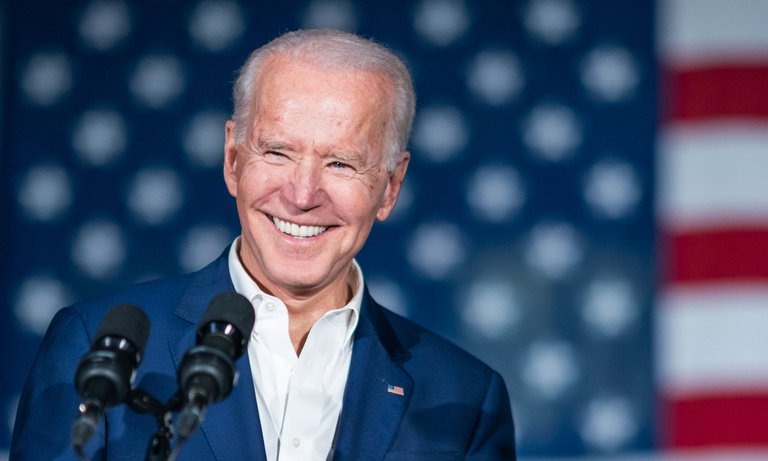
Who Is Joe Biden?
Joe Biden briefly worked as an attorney before turning to politics. He became the fifth-youngest U.S. senator in history as well as Delaware's longest-serving senator. His 2008 presidential campaign never gained momentum, but Democratic nominee Barack Obama selected him as his running mate, and Biden went on to serve two terms as the 47th vice president of the United States. In 2017, at the close of his administration, Obama presented Biden with the Presidential Medal of Freedom. Two years later Biden launched his campaign for U.S. president and was elected as the 46th president of the United States.
Early years
Long before reaching one of the highest political offices in the nation, Biden — born on November 20, 1942 — grew up in the blue-collar city of Scranton in northeast Pennsylvania. His father, Joseph Biden Sr., worked cleaning furnaces and as a used car salesman. His mother was Catherine Eugenia "Jean" Finnegan.
Biden credits his parents with instilling in him toughness, hard work and perseverance. He has recalled his father frequently saying, "Champ, the measure of a man is not how often he is knocked down, but how quickly he gets up." He's also said that when he would come home sullen because he had been bullied by one of the bigger kids in the neighborhood, his mother would tell him, "Bloody their nose so you can walk down the street the next day!'"
Biden attended St. Paul's Elementary School in Scranton. In 1955, when he was 13 years old, the family moved to Mayfield, Delaware—a rapidly growing middle-class community sustained primarily by the nearby DuPont chemical company.
As a child, Biden struggled with a stutter, and kids called him "Dash" and "Joe Impedimenta" to mock him. He eventually overcame his speech impediment by memorizing long passages of poetry and reciting them out loud in front of the mirror.
Biden attended the St. Helena School until he gained acceptance into the prestigious Archmere Academy. Although he had to work by washing the school windows and weeding the gardens to help his family afford tuition, Biden had long dreamed of attending the school, which he called "the object of my deepest desire, my Oz." At Archmere, Biden was a solid student and, despite his small size, a standout receiver on the football team. "He was a skinny kid," his coach remembered, "but he was one of the best pass receivers I had in 16 years as a coach." Biden graduated from Archmere in 1961.
College, Marriage and Law School
Biden attended the nearby University of Delaware, where he studied history and political science and played football. He would later admit that he spent his first two years of college far more interested in football, girls and parties than academics. But he also developed a sharp interest in politics during these years, spurred in part by the inspiring inauguration of John F. Kennedy in 1961.
On a spring break trip to the Bahamas during his junior year, Biden met a Syracuse University student named Neilia Hunter and, in his own words, "fell ass over tin cup in love — at first sight." Encouraged by his new love, he applied himself more fully to his studies and was accepted into the Syracuse University Law School upon his graduation from Delaware in 1965. Biden and Hunter married the next year, in 1966.
Biden was at best a mediocre law student. During his first year at Syracuse, he flunked a class for failing to properly cite a reference to a law review article. Although he claimed it was an accidental oversight, the incident would haunt him later in his career.
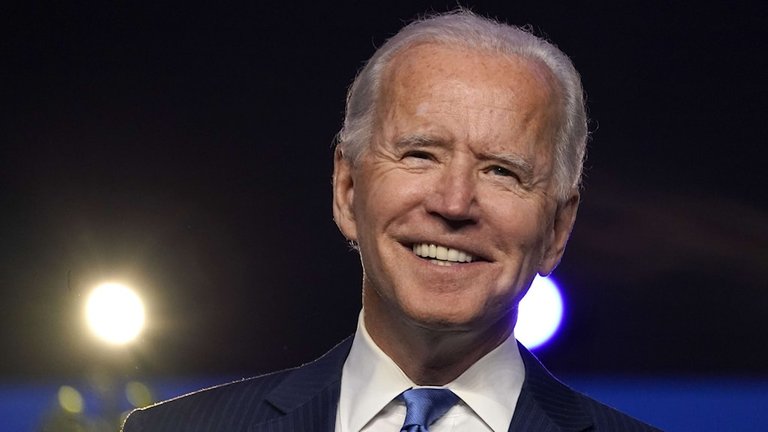
Early Political Career
After graduating from law school in 1968, Biden moved to Wilmington, Delaware, to begin practicing at a law firm. He also became an active member of the Democratic Party, and in 1970 he was elected to the New Castle County Council. While serving as councilman, in 1971, Biden started his own law firm.
In addition to his increasingly busy professional life, Biden had three children: Joseph "Beau" (born in 1969), Robert "Hunter" (born in 1970) and Naomi "Amy" (born in 1971). "Everything was happening faster than I expected," Biden said about his life at the time.
In 1972, the Delaware Democratic Party encouraged a 29-year-old Biden to run against the popular Republican incumbent J. Caleb Boggs for the United States Senate. Although few thought he stood any chance, Biden ran a tireless campaign organized mostly by family members. His sister, Valerie Biden Owens, served as his campaign manager, and both of his parents campaigned daily. That November, in a tight race with a large turnout, Biden won an upset victory to become the fifth-youngest U.S. senator elected in the nation's history.
Family Tragedy
Just as all of Biden's wildest dreams seemed to be coming true, he was struck by devastating tragedy. A week before Christmas in 1972, Biden's wife and three children were involved in a terrible car accident while out shopping for a Christmas tree. The accident killed his wife and daughter and severely injured both of his sons, Beau and Hunter. Biden was inconsolable and even considered suicide. He recalls, "I began to understand how despair led people to just cash in; how suicide wasn't just an option but a rational option ... I felt God had played a horrible trick on me, and I was angry."
Nevertheless, at the encouragement of his family, Biden decided to honor his commitment to representing the people of Delaware in the Senate. He skipped the swearing-in ceremony for new senators in Washington and instead took the oath of office from his sons' hospital room. In order to spend as much time as possible with his sons, Biden decided to continue to live in Wilmington, commuting to and from Washington each day by Amtrak train, a practice he maintained through his entire long tenure in the Senate.
READ MORE: The Heartbreaking Car Accident that Killed Joe Biden's Wife and Daughter
Senate Years
From 1973 to 2009, Biden served a distinguished Senate career. During his time in the Senate, Biden won respect as one of the body's leading foreign policy experts, serving as chairman of the Committee on Foreign Relations for several years. His many foreign policy positions included advocating for strategic arms limitation with the Soviet Union, promoting peace and stability in the Balkans, expanding NATO to include former Soviet-bloc nations and opposing the First Gulf War. In later years, he called for American action to end the genocide in Darfur and spoke out against President George W. Bush's handling of the Iraq War, particularly opposing the troop surge of 2007.
In addition to foreign policy, Biden was an outspoken proponent of tougher crime laws. In 1987, Supreme Court nominee Robert Bork's failure to receive confirmation was largely attributed to harsh questioning by Biden, who was then chairman of the Senate Judiciary Committee. In 1994, Biden sponsored the Violent Crime Control and Law Enforcement Act to add 100,000 police officers and increase sentences for a host of crimes.
Presidential Ambitions
In 1987, having established himself as one of Washington's most prominent Democratic lawmakers, Biden decided to run for the U.S. presidency. He dropped out of the Democratic primary, however, after reports surfaced that he had plagiarized part of a speech.
Biden had been suffering severe headaches during the campaign, and shortly after he dropped out in 1988, doctors discovered that he had two life-threatening brain aneurysms. Complications from the ensuing brain surgery led to blood clots in his lungs, which, in turn, caused him to undergo another surgery. Always resilient, Biden returned to the Senate after surviving a seven-month recovery period.
U.S. Vice President
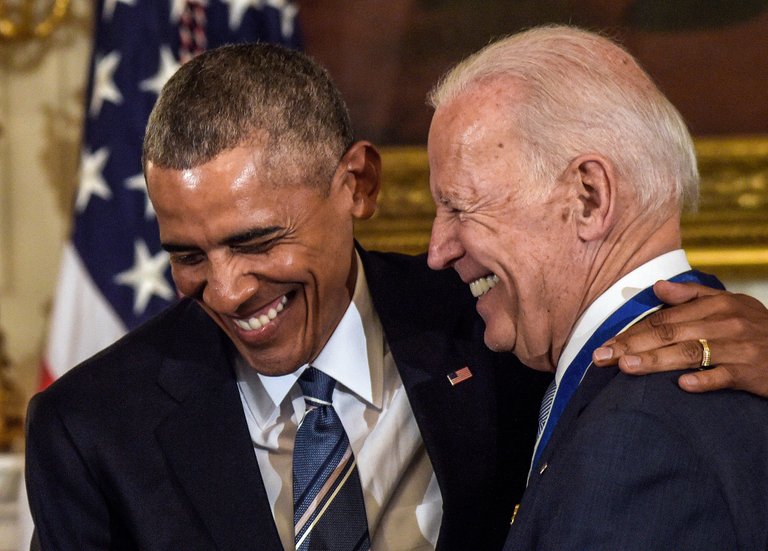
In 2007, 20 years after his first unsuccessful presidential bid, Biden once again decided to run for the U.S. presidency. Despite his years of experience in the Senate, however, Biden's campaign failed to generate much momentum in a field dominated by Hillary Clinton and Barack Obama. Biden dropped out after receiving less than one percent of the vote in the crucial Iowa caucuses.
Several months later, though, Obama — having secured the Democratic nomination after a hard-fought campaign against Clinton — selected Biden as his running mate. With his working-class roots, Biden helped the Obama campaign communicate its message of economic recovery to the blue-collar voters crucial to swing states like Ohio and Pennsylvania.
On November 2, 2008, Barack Obama and Joe Biden convincingly defeated the Republican ticket of Arizona Senator John McCain and Alaska Governor Sarah Palin. On January 20, 2009, Obama was sworn in as the 44th U.S. president and Biden became the 47th vice president.
While Biden mostly served in the role of behind-the-scenes adviser to the president, he took particularly active roles in formulating federal policies relating to Iraq and Afghanistan. In 2010, the vice president used his well-established Senate connections to help secure passage of the New Strategic Arms Reduction Treaty between the United States and the Russian Federation.
Biden seemed to relish the opportunity to play a crucial role in the Obama Administration. Following the 2008 election, he said, "This is an historic moment. I started my career fighting for civil rights, and to be a part of what is both a moment in American history where the best people, the best ideas, the how can I say it?—the single best reflection of the American people can be called upon—to be at that moment, with a guy who has such incredible talent and who is also a breakthrough figure in multiple ways—I genuinely find that exciting. It's a new America. It's the reflection of a new America."
Re-Election and Second Term
Running for re-election in 2012, the Obama-Biden team faced Republican challenger Mitt Romney, a former governor of Massachusetts, and Romney's vice-presidential running mate, U.S. Representative Paul Ryan of Wisconsin. Obama defeated Romney in the 2012 election, earning a second term as president and Biden another term as vice president. President Obama received nearly 60 percent of the electoral vote, and won the popular vote by more than 1 million ballots.
Later that year, Biden showed just how influential a vice president he could be. He was instrumental in achieving a bipartisan agreement on tax increases and spending cuts to avoid the fiscal cliff crisis. With a looming deadline, Biden was able to hammer out a deal with Senate Minority Leader Mitch McConnell. On January 1, 2013, the fiscal cliff bill passed in the Senate after months of tough negotiations. The House of Representatives approved it later that day.
Around this time, Biden also became a leading figure in the national debate about gun control. He was selected to head up a special task force on the issue after the school shooting at a Newtown, Connecticut elementary school that December. Biden delivered solutions for reducing gun violence across the nation to President Obama in January 2013. He helped craft 19 actions that the president could take on the issue using his power of executive order among other recommendations.
Personal Life and Post-White House
Biden has been married to his second wife, Jill Biden, since 1977. The couple's daughter, Ashley, was born in 1981. On May 30, 2015, Biden suffered another personal loss when his son Beau died at the age of 46, after battling brain cancer. "Beau Biden was, quite simply, the finest man any of us have ever known," Biden wrote in a statement about his son.
Following this tragedy, Biden considered a run for the presidency, but he put the speculation to rest in October 2015 when he announced that he would not seek the 2016 Democratic nomination. In the White House Rose Garden with his wife Jill and President Obama by his side, Biden made his announcement, referring to his son's recent death in his decision making: "As my family and I have worked through the grieving process, I've said all along what I've said time and again to others, that it may very well be that the process by the time we get through it closes the window. I've concluded it has closed."
Biden added: "While I will not be a candidate, I will not be silent. I intend to speak out clearly and forcefully, to influence as much as I can where we stand as a party and where we need to go as a nation."
On January 12, 2017, President Obama presented Biden with the Presidential Medal of Freedom with distinction, the nation's highest civilian honor, in a surprise ceremony at the White House. Obama called Biden "the best vice president America's ever had" and a "lion of American history," and told him he was being honored for ‘‘faith in your fellow Americans, for your love of country and a lifetime of service that will endure through the generations.’’ Biden gave an emotional impromptu speech thanking the president, First Lady Michelle Obama, his wife Jill and his children.
As promised, Biden refused to remain quiet even after leaving office. Known for his opposition to Obama's successor, Donald Trump, he occasionally surfaced to criticize the 45th president. At an October 2017 event he declared that Trump "doesn't understand governance," and the following month he blasted the White House incumbent for his seeming defense of white nationalist groups.
Additionally, Biden occasionally revealed his mixed feelings on bypassing the chance to run for president in 2016. In March 2017, he said he "could have won," and in November, he elaborated on those thoughts in an interview with Oprah Winfrey. "No woman or man should announce they’re running for president unless they can answer two questions," he said. "One, do they truly believe they’re the most qualified person for that moment? I believed I was — but was I prepared to be able to give my whole heart, my whole soul, and all my intention to the endeavor? And I knew I wasn’t."
A few weeks later, on the talk show The View, Biden had a much-publicized interaction with co-host Meghan McCain, whose dad, Senator John McCain, had been diagnosed with the same brain cancer that killed Beau Biden. When Meghan McCain became visibly upset while discussing the disease, the VP gently took her hand to console her, pointing out how Senator McCain inspired everyone with his courage. "There is hope," he said. "And if anybody can make it, your dad [can]."
In an interview with Al Sharpton the following spring, Biden said he hadn't ruled out running for president in 2020, though he still hadn't recovered enough from his son's death to devote himself to the effort. "I'm really hoping that some other folks step up," he said. "I think we have some really good people. … I got to walk away knowing that it is — there's somebody who can do it and can win because we've got to win. We've got to win in 2020."
The results of a Harvard CAPS/Harris poll in June suggested that Democrats weren't ready to let Biden walk away just yet, as he topped the poll with 32 percent of participants naming him their favorite for the party's nomination in 2020. Hillary Clinton came in second at 18 percent, with Bernie Sanders finishing third at 16 percent.
While still contemplating a presidential run the following March, Biden faced a new problem when Lucy Flores, a former Nevada state assemblywoman, published an essay that described Biden inappropriately kissing her at a campaign event. Biden responded with a statement in which he recalled the "countless handshakes, hugs, expressions of affection, support and comfort," he offered to political allies over the years, adding, "And not once — never — did I believe I acted inappropriately. If it is suggested I did so, I will listen respectfully. But it was never my intention."
A few days later, a former congressional aide named Amy Lappos came forward with her story of how Biden once made her uncomfortable at a fundraiser, indicating the issue would likely linger through a presidential campaign.
2020 Presidential Campaign
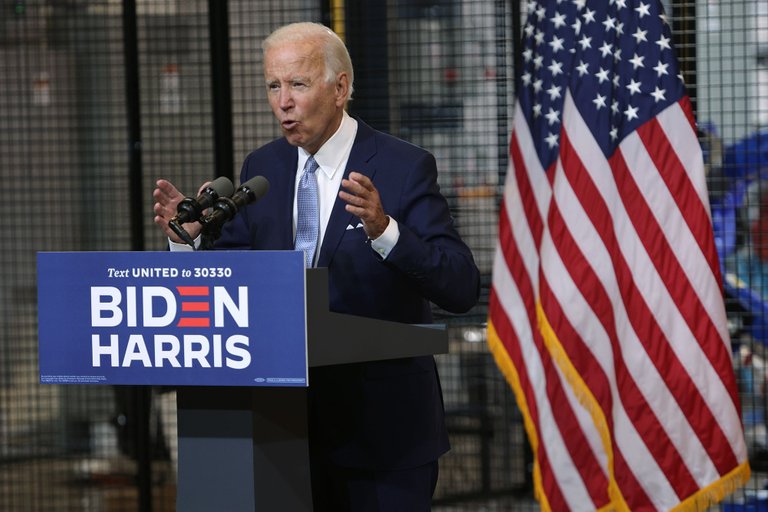
On April 25, 2019, Biden delivered the expected news that he was running for president in 2020.
In his 3 1/2-minute video announcement, the former VP referenced President Trump's attempt to equate people on both sides of the violent, racially charged clash in Charlottesville, Virginia, in 2017, saying he knew then that "the threat to our nation was unlike any I’d ever seen in my lifetime."
Although he easily led most Democratic polls at the time he entered the race, Biden's candidacy soon became a litmus test for a party with an increasingly progressive base. Underscoring the challenges of presenting himself as a moderate, Biden drew criticism for affirming his support of the Hyde Amendment, a 43-year-old measure that banned federal funding for abortions, before reversing his position shortly afterward.
During the first Democratic primary debate in late June, Biden again found his track record targeted when Kamala Harris took him to task for his opposition to busing as a means of integrating schools in the 1970s. He fared better in subsequent debates, in which he demonstrated his sound grasp of foreign policy and tied his accomplishments to those of President Obama.
Meanwhile, a new issue surfaced in September 2019 with the revelation that President Trump had pressured the Ukrainian government into investigating Biden and his son Hunter. This stemmed from Hunter's former involvement with a Ukrainian energy company, Burisma Holdings, and Biden's efforts to have the country's prosecutor general at the time fired.
In a September 24 speech, Biden called Trump's actions an "abuse of power" and said he would support impeachment if the president did not cooperate with Congress, a topic that took on additional urgency when House Speaker Nancy Pelosi ignited impeachment proceedings that same day.
After Trump's impeachment trial ended with his acquittal on February 5, 2020, Biden finished fourth in the Iowa caucuses and then fifth in the New Hampshire primary. But he rebounded with a resounding win in South Carolina at the end of the month, and continued his momentum by claiming the majority of delegates from Super Tuesday voting in early March, his surge driving most of his top competitors from the race.
During a one-on-one debate with Sanders in mid-March, Biden committed to nominating a woman to serve as his vice president. He became the presumptive Democratic nominee when Sanders ended his campaign in early April, though he also found himself facing new allegations of sexual assault, this time from a former aide named Tara Reade.
On August 11, 2020, Biden announced Kamala Harris as his vice presidential running mate. "I have the great honor to announce that I’ve picked Kamala Harris — a fearless fighter for the little guy, and one of the country’s finest public servants — as my running mate," Biden said. "Back when Kamala was Attorney General, she worked closely with Beau. I watched as they took on the big banks, lifted up working people, and protected women and kids from abuse. I was proud then, and I'm proud now to have her as my partner in this campaign."
In August, Biden officially became the 2020 Democratic presidential nominee.
Presidential Debates With Trump
The much-anticipated first presidential debate between Biden and Trump on September 29, 2020, was a messy affair marked by frequent interruptions and heated discussions that quickly spiraled off-topic. A flustered Biden called his opponent a "clown," but he also managed to get in several shots at the president's handling of the coronavirus pandemic, and emphatically presented his views on law enforcement and climate change.
A second debate was scheduled for October 15, but after Trump declined to do a virtual debate, town halls for both candidates were scheduled instead.
With microphones often muted during the third debate on October 22, Biden faced fewer interruptions as he articulated his positions on health care, immigration overhaul and green jobs. He also again unloaded on the president for his coronavirus management and policy of separating migrant children from their parents at the border, drawing a clear distinction between their styles with the declaration that "America's character is on the ballot."
2020 Election Win
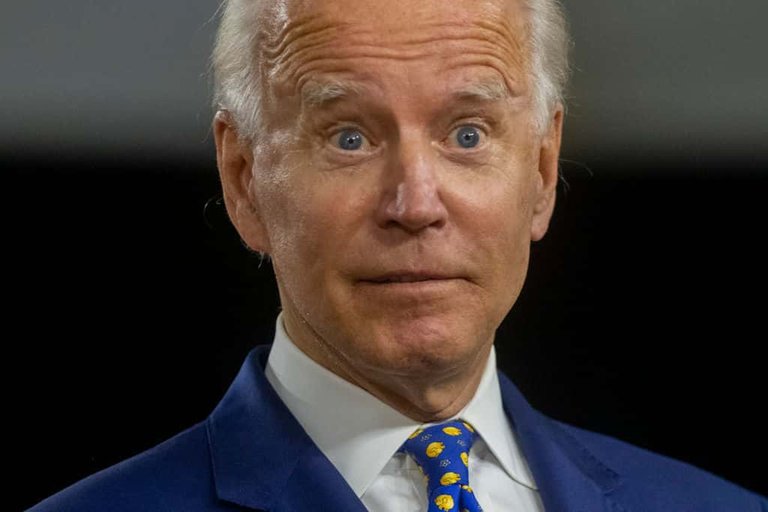
With several states counting mail-in ballots well past the close of polling places on November 3, 2020, the race remained too tight to call into the next day. However, the tide began shifting in Biden's favor with the announcements of his victories in Wisconsin and Michigan, along with reports of his leads in Arizona, Nevada and Georgia. Meanwhile, President Trump launched a series of lawsuits that alleged voter fraud and sought to halt the counting in battleground states.
On November 7, 2020, four days after election day, Biden was declared as the 46th president-elect after winning Pennsylvania. Along with earning a record 81 million-plus votes, the soon-to-be 78-year-old was set to become the oldest president in the nation's history.
"America, I’m honored that you have chosen me to lead our great country," Biden tweeted. "The work ahead of us will be hard, but I promise you this: I will be a President for all Americans — whether you voted for me or not. I will keep the faith that you have placed in me."
On December 14, 2020, all 538 electors in the Electoral College cast their vote, formalizing Biden’s victory over President Trump in the 2020 presidential election. Biden received 306 votes and Trump received 232. Although he moved forward with the selection of Cabinet members and other staffers, Biden initially found his transition efforts thwarted by Emily Murphy, head of the General Services Administration, who refused to release federal funds for the process until November 23.
Capitol Siege
On January 6, 2021, after the start of a congressional session to formalize the Electoral College results, a mob of Trump supporters stormed the Capitol building and overwhelmed the police, forcing lawmakers to evacuate for their safety.
Biden soon delivered a speech in which he pleaded for Trump to help put an end to the chaos.
"At their best the words of a president can inspire. At their worst, they can incite," he said. "Therefore, I call on President Trump to go on national television now to fulfill his oath and defend the constitution and demand an end to this siege."
Following the violence that resulted in more than 80 arrests and five deaths, the congressional session resumed and continued well past midnight, with Vice President Mike Pence formally announcing Biden's presidential win just after 3:40 a.m. on January 7.
Inauguration
Biden was sworn in as the 46th president of the United States on January 20, 2021. "This is America’s day. This is democracy’s day. A day of history and hope. Of renewal and resolve. Through a crucible for the ages America has been tested anew and America has risen to the challenge. Today, we celebrate the triumph not of a candidate, but of a cause, the cause of democracy. The will of the people has been heard and the will of the people has been heeded. We have learned again that democracy is precious. Democracy is fragile. And at this hour, my friends, democracy has prevailed," he said in the opening of his inaugural address.
Posted Using LeoFinance Beta
Great post!
Posted Using LeoFinance Beta
wow, this information made my cock throb
Posted Using LeoFinance Beta